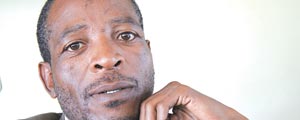
There is no doubt the recent exposure of acts of corruption and outright theft by members of the Zimbabwe Republic Police (ZRP) Traffic Section sparked public outrage and became subject of national conversation.
Landscape by Tangai Chipangura
A lot of people blame the rot that has pervaded our police force on their commanders and the policies that guide them. The argument is that the corruption is masterminded at the top where senior officers are the biggest beneficiaries. The reasoning is that it is not possible that police bosses are not aware of this magnitude of decay among their charges.
It is the duty of newspapers to expose, as they have done, this rot and also to publish what the people say about that moral and professional decay because it affects them. It is also the duty of the media to tell the people what the police say about this behaviour.
That is why it is necessary and important to have those that are tasked to speak on behalf of the police, to comment — to confirm and substantiate media findings or dismiss them, whatever the case may be.
The source of my concern is the statement that was recently issued by the National Police Spokesperson, Chief Staff Officer (Press and Public Relations) Senior Assistant Commissioner Charity Charamba on the matter to do with the exposure by this newspaper of corruption within the police force.
Indeed, I am compelled to commend Charamba for noting that the police “values stakeholder support and acknowledges that the media are part of the stakeholders” and also that “reporting cases should always be done in a responsible manner, free from exaggerations and concoctions for the benefit of all”. I am all the same, however, baffled by the larger part of her lengthy statement in which she seeks to chide, in fact scold the media without justifiable reason.
She accuses the media of getting “carried away by engaging in shrill, emotive and unsubstantiated utterances”. She says too that: “It is ridiculous to note that certain media houses allege that police do not act on corruption whilst at the same time in the same article they acknowledge that police are dealing decisively with acts of corruption by arresting perpetrators of crime.
- Chamisa under fire over US$120K donation
- Mavhunga puts DeMbare into Chibuku quarterfinals
- Pension funds bet on Cabora Bassa oilfields
- Councils defy govt fire tender directive
Keep Reading
“The same article actually cites cases where police have arrested two officers caught on the wrong side of the law. The question is; who has arrested those police officers? Is it the media?”
Charamba goes on to say: “The only conclusion is that this irresponsibility (by the media) is based on an intent to score cheap points which will definitely not help anyone including themselves.”
She concludes her statement by saying “The Zimbabwe Republic Police is actually on top of the drive against corruption”.
What, to begin with, I find interesting is that this statement was issued in apparent response to NewsDay’s quest for a comment on our information that two police officers had been arrested in connection with the Beatrice police bribery case in which a 10-year-old girl had picked up about $2 000 which had apparently been hidden in a rubbish pit by traffic police manning a roadblock along the Harare-Masvingo Highway.
For more than a day of persistent requests for comment on the arrest of the two officers, Charamba kept saying she would be issuing a statement — which statement she finally did issue — lambasting us for alleged irresponsible reporting.
When NewsDay first approached Charamba for comment following our discovery of the Beatrice police loot incident, she said police were not aware of the incident.
When, after the publication of the first story in which she professed ignorance of the happening, we approached her again for comment after we collected more detail on the same incident, including the arrest of the two cops, she simply said police are investigating the matter. After that she then promised the statement which came after two days.
The statement attacks our article, but still does not tell us whether it is true or not that two cops had been arrested, save to imply they had indeed been arrested by a hardworking and transparent police force. “. . .The question is, who has arrested those police officers? Is it the media?” she asks in apparent ridicule.
The issue here is that it is not fair for police to deliberately refuse to give useful information to their crime combat “stakeholders” and then go ahead to attack them for alleged irresponsible reporting — even though that reporting turns out to be accurate.
Like I have already said, it is the responsibility of the media to give readers as much information as possible, including, where there is need, police comment. It is also important for the police to note that it is not necessarily the media that attacks them for allegedly doing nothing to combat crime, but it is the people. The media simply publishes what the people say.
We all trust the commitment by the police, in Charamba’s statement, that “a raft of radical razor edge internal disciplinary measures, supervisory and monitoring mechanisms” has been put in place to nip the corruption scourge in the bud and that instant dismissal and “public shame of booted errant officers” will be seen to be taking place.
The Avondale cleanup is a refreshing development, although it may not be easy to view transfers as a “radical razor edge measure” to punish proven criminality.











